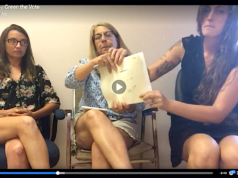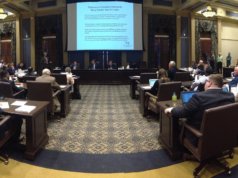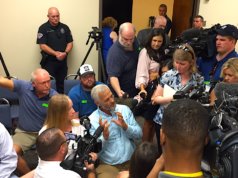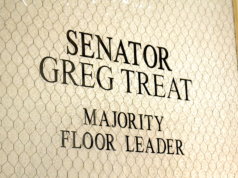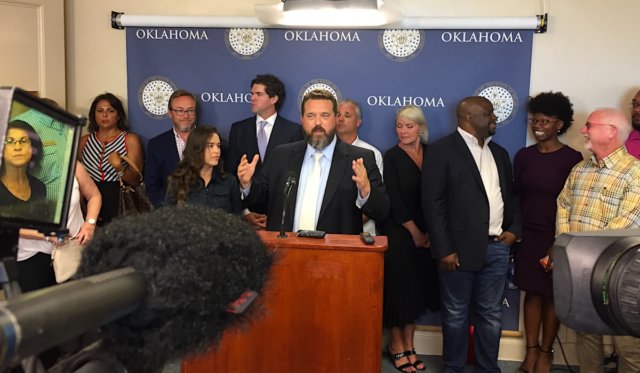
From his position as House Majority Floor Leader, Rep. Jon Echols (R-OKC) has met with both factions of Oklahoma’s medical marijuana advocacy groups, which do not agree on how best to implement State Question 788 and have seen their interactions grow more tense since the vote June 26.
Echols said this afternoon that all parties have good ideas, but he compared the groups to Oklahoma’s oft-disagreeing oil and gas associations, and he said he offers each the same biblical advice.
“My life verse is when the Apostle Paul said, ‘If it is within your power, live in peace with everyone,'” Echols quoted. “It is within their power, and it would be better for everyone if they could find a way. That’s the same advice I gave OKOGA, OIPA and OEPA.”
One of the medical cannabis groups Echols was referencing, New Health Solutions Oklahoma, held a press conference this afternoon to release a memo detailing a list of “statutory requirements” that the organization believes the Legislature should address in a special session.
“The unilateral call against special session last week was effectively a thumb in the eye of this industry,” said NHSO executive director Bud Scott. “If we do not address these through legislation, we are setting up the State Department of Health for regulatory failure.”
Surrounded by NHSO members who are planning to start medical cannabis businesses, Scott pointed to litigation that has delayed medical marijuana implementation in states such as Maine and Louisiana. He also said some states — such as Oregon, Washington and Arizona — have seen economic turbulence without limitations to dispensing and growing licenses.
“This has to be done by statute. It cannot be done through regulations,” he said. “This is not something we can have a 30-minute press conference on and cover every single detail of the industry.”
Scott emphasized his belief that many necessary regulations — detailed in a document below — are not discussed under SQ 788, meaning the Oklahoma State Department of Health does not have authority to write corresponding rules. One concern of Scott’s is the potential for over-saturation of the nascent industry unless some sort of cap on the number of licenses is added.
“Oregon has capped. They are not issuing any new cultivation licenses. Having an understanding of how this actual system operates, it’s very important when you’re developing public policy,” Scott said. “(If there are too many licenses), there will be market saturation. We’ve already run economic models that show projections on how much product would actually be consumed in Oklahoma. If we have unlimited licensure, we will saturate the market within one year, and no one will make a profit.”
Chip Paul: ‘We don’t want to go back in’
But as Echols discussed, not all pro-cannabis advocates agree with Scott that Gov. Mary Fallin should call a special session.
“What do lawmakers do? They make laws,” Oklahomans for Health co-founder Chip Paul also said Thursday. “Well, we’ve made our law, and we just need to make regulations around it, and that’s what the Health Department does and they are experts with it.
“We don’t want to go back in a special session.”
Paul and others have formed the Oklahoma Cannabis Trade Association, and last week they held their own press conference to express opposition to a special legislative session. Paul said Thursday that he “would prefer” that Scott’s group “come under our umbrella with our message” that OSDH regulations should be sufficient for SQ 788 implementation.
“I don’t know why they won’t do that unless they have some other agenda,” Paul said. “I don’t think that there’s bad blood. (…) We’re not at war with anybody. We’re not trying to be at war with anybody.”
But on Monday, Green The Vote leader Isaac Caviness recorded a Facebook live video that profanely criticized Scott and Yes on 788 PAC director Frank Grove. Like Paul, Caviness is a board member of the Oklahoma Cannabis Trade Association, and his Monday rant drew praise from Facebook friends while raising the eyebrows of legislators and others observing the rift between cannabis advocates.
“Isaac has reasons for that, but that’s nobody’s business but Isaac and Frank’s,” Paul said before offering his own criticism of Grove. “You got one guy pissing everybody off and calling everybody names.”
But in Caviness’ video, he calls Grove names.
“Fuck Dean Franklin Grove. I don’t care, you all can share it with him,” Caviness said in the 20-minute video. “You can screenshot this to him. He’s not going to be commenting on this because he’s too big of a chickenshit to ever let me see anything he has to say. He blocked me so that I wouldn’t be able to comment on any of his bullshit that he’s putting out there about me, about Green The Vote, about Oklahomans for Health, about Chris Moe — Uncle Grumpy — any of these things.”
Reached Thursday, Grove said he has yet to respond to Caviness’ video. But he said the Yes on 788 PAC is morphing its membership into a separate organization that will be dedicated to patient advocacy.
“I believe that the voice of patients and advocates is getting lost in the sea of monetary special interest, and our group is the only group dedicated to the interests of patients in 788,” Grove said.
Echols: ‘Bud’s fears are legitimate’
Paul said patient interests are represented well under the law as written.
“If it’s in the law, it’s the law,” Paul reiterated when asked why his groups oppose special session. “We don’t need to change that. We need to test the law, and we need to make sure that it’s an appropriate law, and if it’s failing in some way then we need to change that. But we haven’t even tested the law.”
But Scott disagrees, arguing that successful medical marijuana programs have commonalities not included in the rules proposed by the OSDH.
“The fact they don’t understand all these issues is, I think, paramount to show where they are at in this discussion,” Scott said of Paul’s organization.
While he said he tries not to engage in Facebook arguments, he responded to a description of Caviness’ video.
“I think that demonstrates the level of professionalism and preparedness these folks are operating under,” Scott said.
Echols said both groups have good ideas but that he and other lawmakers represent their constituents, not one side or another between disagreeing organizations.
“To the extent they can find a way to work together, they are more likely to get what they want,” said Echols, who added that he has a working draft of statutory changes he believes all parties could ultimately support. “Bud’s fears are legitimate. I don’t pretend to be the economic expert, but when I look at some things that have happened in other states, Bud’s fears are absolutely legitimate that you can oversupply the market.
“And Chip had some really good ideas that he sent me.”
Voters passed SQ 788 on June 26 with 56.8 percent favoring the legalization of medical marijuana in Oklahoma. Echols said the broad support shown for the issue solidifies the House’s position that “dismantling” or “gutting” SQ 788 would be off the table in special or regular session.
“My position on special session for 788 has always been, if we are going to have one, whatever we do, I want it decided ahead of time,” he said.
New Health Solutions Oklahoma issues special session memo
Scott’s group released the following memo Thursday, which listed what it believes are necessary statutory direction for the Oklahoma State Department of Health.
